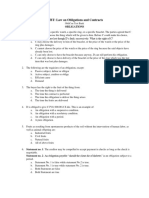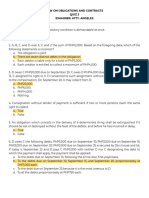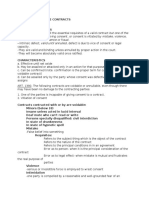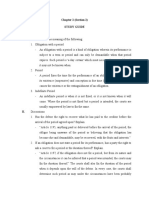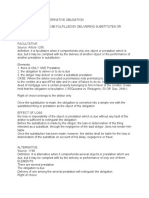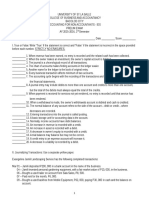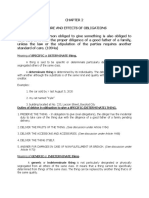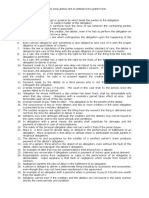0 ratings0% found this document useful (0 votes)
112 viewsRFBT Latin Terms
RFBT Latin Terms
Uploaded by
alliahbilities currentThis document provides definitions for over 70 Latin legal terms related to contracts, obligations, property, and civil law. Some of the key terms defined include: culpa aquiliana (civil negligence), dolus (fraud), ex contractu (contracts), in solidum (solidary/joint and several obligation), ipso jure (by operation of law), mancomunada (joint obligation), mora (default), negotiorum gestio (management of business), pactum commisorium (creditor's right to seize collateral), prima facie (at first impression), quantum meruit (reasonable payment for services), res judicata (settled matter), and status quo (existing circumstances). It also defines
Copyright:
© All Rights Reserved
Available Formats
Download as PDF, TXT or read online from Scribd
RFBT Latin Terms
RFBT Latin Terms
Uploaded by
alliahbilities current0 ratings0% found this document useful (0 votes)
112 views4 pagesThis document provides definitions for over 70 Latin legal terms related to contracts, obligations, property, and civil law. Some of the key terms defined include: culpa aquiliana (civil negligence), dolus (fraud), ex contractu (contracts), in solidum (solidary/joint and several obligation), ipso jure (by operation of law), mancomunada (joint obligation), mora (default), negotiorum gestio (management of business), pactum commisorium (creditor's right to seize collateral), prima facie (at first impression), quantum meruit (reasonable payment for services), res judicata (settled matter), and status quo (existing circumstances). It also defines
Original Description:
Latin Summary RFBT
Original Title
RFBT LATIN TERMS
Copyright
© © All Rights Reserved
Available Formats
PDF, TXT or read online from Scribd
Share this document
Did you find this document useful?
Is this content inappropriate?
This document provides definitions for over 70 Latin legal terms related to contracts, obligations, property, and civil law. Some of the key terms defined include: culpa aquiliana (civil negligence), dolus (fraud), ex contractu (contracts), in solidum (solidary/joint and several obligation), ipso jure (by operation of law), mancomunada (joint obligation), mora (default), negotiorum gestio (management of business), pactum commisorium (creditor's right to seize collateral), prima facie (at first impression), quantum meruit (reasonable payment for services), res judicata (settled matter), and status quo (existing circumstances). It also defines
Copyright:
© All Rights Reserved
Available Formats
Download as PDF, TXT or read online from Scribd
Download as pdf or txt
0 ratings0% found this document useful (0 votes)
112 views4 pagesRFBT Latin Terms
RFBT Latin Terms
Uploaded by
alliahbilities currentThis document provides definitions for over 70 Latin legal terms related to contracts, obligations, property, and civil law. Some of the key terms defined include: culpa aquiliana (civil negligence), dolus (fraud), ex contractu (contracts), in solidum (solidary/joint and several obligation), ipso jure (by operation of law), mancomunada (joint obligation), mora (default), negotiorum gestio (management of business), pactum commisorium (creditor's right to seize collateral), prima facie (at first impression), quantum meruit (reasonable payment for services), res judicata (settled matter), and status quo (existing circumstances). It also defines
Copyright:
© All Rights Reserved
Available Formats
Download as PDF, TXT or read online from Scribd
Download as pdf or txt
You are on page 1of 4
RFBT - Latin Terms
Ab initio. – From the beginning.
Accesion continua. – Accession to the products of the thing.
Accession industrial. – (3 forms of building, planting, and sowing.) Those
produced by land of any kind through cultivation or labor.
Accession natural. – (Alluvion.) The increase in the area of a land without
any act of the owner.
Accion pauliana. – The right of the creditor to set aside or revoke the acts
which the debtor may have done to defraud him.
Accion reivindicatoria. – An action to recover ownership over a real
property.
Accion subrogatoria. – (subrogatory action.) – An action which the creditor
may exercise his right on the negligent debtor by taking his abandoned
property to satisfy his own credit.
Ad litem. – (Guardian) Appointed to act in a lawsuit on behalf of a child or
other person who is not considered capable of representing themselves.
Bonos pater familias. – A good father of a family.
Case fortuito, force majeure, fuerza mayor. – (Fortuitous event.) An event
which takes place by accident and could have not been forseen. 2 General
causes. – By nature and by the act of a man.
Compensatio Morae. – Default or delay on both parties on reciprocal
obligation.
Culpa contractual. – Contractual negligence. Negligence in the performance
of a contract.
Culpa criminal. – Criminal negligence.
Culpa aquiliana. – Civil negligence. (Quasi delict, tort) acts or omission
causes damage to another, there being fault or negligence, is oblige to pay for
the damages done. Also know as Culpa extra contractual.
Culpa. – Negligence.
Custodia legis. – In the custody of the law; the taking, seizing or holding of
something by lawful authority
Damnum. – To the damage. / damage. A clause in a complaint that states the
damage for which the individual seeks judicial relief.
Disimulados. – Veiled, hidden.
Dolo causante. – Causal Fraud.
Dolo incidente. – Incidental Fraud.
Dolo. – Fraud.
Dolus bonus. – simple cunning or sagacity in bargaining or in other
transactions that is not actionable or punishable as fraud or misrepresentation
or ground for rescinding the transaction induced by it.
Ex contractu. – Contracts
Ex die. – (suspensive period) From the day certain.
Ex lege. – Law.
Ex maleficio. – Acts or omission punished by law.
Fideiussoria. – Guarantee.
Fideiussorio. – Guarantor
Genus nun quam perit. – Genus never perishes.
In diem. – (resolutory period) To a day certain.
In toto. – Complete or In total.
Injuria. – Invasion of another’s right for which one may bring an action.
Inter vivos. – (Between the living) A phrase used to describe a gift that is
made during the donor’s lifetime.
Ipso Jure. – By law itself; By operation of Law.
Juntos o separadamene. – when written in a promisory note creates a
solidary responsibility.
Mancomunada solidaria, Joint and several, or In solidum. – Solidary
Obligation.
Mancomunada, macomunada simple. – Joint obligation.
Mora accipiendi. – Default or delay on part of the creditor.
Mora solvendi. – Default or delay on the part of the debtor.
Mora solvendi ex- re - Debtor’s default in real obligation.
Mora solvendi ex- persona - Debtor’s default in personal obligation.
Compensatio Morae - Default on the part of both parties.
Mora. – Default or delay.
Mortis causa. – (In contemplation of approaching death) A phrase sometimes
used in reference to a deathbed gift, or a gift causa mortis, since the giving of
the gift is made in expectation of approaching death. A gift causa mortis is
distinguishable from a gift inter vivos, which is a gift made during the donor’s
(the giver’s) lifetime.
Mutuum. – Simple loan.
Negotiorum gestio. – (management of business) is a type of spontaneous
agency or interference by a person, called a negotiorium gestor, in the affairs
of another in his absence.
Non nudis pactis, sed traditione dominia rerum transferentur. – The
ownership of a thing is transferred not by mere agreement but by delivery.
Pacto de retro. – The essence of a pacto de retro sale is that the title and
ownership of the property sold are immediately vested in the vendee a retro,
subject to the resolutory condition of repurchase by a vendor a retro to
repurchase the property within the period agreed upon by them, or, in the
absence thereof, as provided by law, vests upon the vendee a retro absolute
title and ownership over the property sold by operation of law.
Pactum commisorium. – The automatic appropriation by the creditor of the
thing pledged or mortgaged upon the failure of the debtor to pay the principal.
Pari delicto. – Both party at fault.
Pollicitatio. – An offer without acceptance is not binding. Not strictly a
contract at all but a unilateral gratuitous obligation.
Pour autrui. – A contract or provision in a contract that confers a benefit on a
third-party beneficiary NOTE: A stipulation pour autrui gives the third-party
beneficiary a cause of action against the promisor for specific performance.
Prima facie. – Based on the first impression; accepted as correct until proved
otherwise.
Pro rata. – Proportional.
Quantum meruit. – A reasonable sum of money to be paid for services
rendered or work done when the amount due is not stipulated in a legally
enforceable contract.
Quasi contractu. – Quasi contracts.
Quasi excontractu. – An equitable theory that finds an obligation to
compensate or restore a benefit conferred on.
Quasi maleficio. – Quasi delict.
Qui sentit sentire debet et in commodum. – He who enjoys the benefit
ought also to bear the burden.
Quien calla otorga. – Silence is consent or whoever is silent, consents.
Ratione Legis. – The reason for a law ceasing, the law itself ceases.
Rebus sic stantibus. – (things standing thus) stipulates that, where there has
been a fundamental change of circumstances, a party may withdraw from or
terminate the treaty in question.
Res judicata. – A matter already judged. A case in which there has been a
final judgement and no longer subject to appeal.
Res suo domino perit. – The thing is lost or destroyed by the owner.
Simulados. – Simulated.
Solutio indebiti. – The case where one had paid a debt, or done an act or
remitted a claim because he thought that he was bound in the law to do so,
when he was not. In such mistake there is an implied obligation.
(quasi-contractu)
Status quo. – Existing state of circumstances.
Vinculum juris. – Legal tie.
Void ab initio. – To be treated as invalid from the outset.
A kind of Constructive delivery whereby:
Traditio Simbolica - There is delivery when the keys of a warehouse are
given
Traditio Longa-manu - There is delivery by mere consent or the pointing out
of the object
Traditio Brevi-manu - A possessor of a thing not as an owner, becomes the
possessor as owner
Traditio Constitutom Possessorium - A possessor of a thing as an owner
retains possession no longer as an owner but in some other capacity
Constitutom possessorium - the opposite of brevu-manu
You might also like
- Capital Markets Chapter 3Document11 pagesCapital Markets Chapter 3Faith FajarilloNo ratings yet
- Duties of Debtor Right of CreditorDocument7 pagesDuties of Debtor Right of CreditorLimVianesseNo ratings yet
- OBLICON Quiz 1 and 2Document16 pagesOBLICON Quiz 1 and 2hatdognamaycheese123No ratings yet
- OBLICON - Module 3&4Document12 pagesOBLICON - Module 3&4Ma Leslie BuhanghangNo ratings yet
- Q: What Is An Obligation?: Obligations IDocument12 pagesQ: What Is An Obligation?: Obligations IRonbert Alindogan RamosNo ratings yet
- Oblicon Practice ExamDocument5 pagesOblicon Practice ExamNica Del RosarioNo ratings yet
- 4 - Conceptual Framework: Elements of Financial StatementsDocument7 pages4 - Conceptual Framework: Elements of Financial Statementsagm25No ratings yet
- 1 - General Provisions of ContractsDocument58 pages1 - General Provisions of ContractsAlyssa Coleen Patacsil Dolorito100% (1)
- Quiz ObliconDocument7 pagesQuiz ObliconJunaly PanagaNo ratings yet
- Oblicon ReviewerDocument6 pagesOblicon ReviewerFatima Elaine AtienzaNo ratings yet
- OBLICON ACT-03 Kinds of ObliDocument28 pagesOBLICON ACT-03 Kinds of OblidaughnNo ratings yet
- RFBT 04 09 Law On SalesDocument71 pagesRFBT 04 09 Law On Salesmarin100% (1)
- A Study On Income Tax Law & Accounting 2019Document26 pagesA Study On Income Tax Law & Accounting 2019Novelyn Hiso-anNo ratings yet
- General Provisions Part 2: Civil Code Art. 1156-1162Document28 pagesGeneral Provisions Part 2: Civil Code Art. 1156-1162Jobelle Grace SorianoNo ratings yet
- Article 1246Document2 pagesArticle 1246VICTORIA ME�OZANo ratings yet
- MODULE 12 OBLIGATIONS and CONTRACTSDocument12 pagesMODULE 12 OBLIGATIONS and CONTRACTSShayne PagwaganNo ratings yet
- OBLIGATIONS AND CONTRACTS Session 4Document67 pagesOBLIGATIONS AND CONTRACTS Session 4Mary Ann BandolaNo ratings yet
- Reviewer On Obligation - Multiple ChoiceDocument9 pagesReviewer On Obligation - Multiple ChoiceChichay PotpotNo ratings yet
- Oblicon Test Bank 050350Document23 pagesOblicon Test Bank 050350PEA- Princess Nicole lentijaNo ratings yet
- ARTICLE 1156 - 1160 DISCUSSION - Obligations and ContractsDocument6 pagesARTICLE 1156 - 1160 DISCUSSION - Obligations and ContractsKeith Jasper Mier100% (1)
- Chapter 8: Facility and Work DesignDocument11 pagesChapter 8: Facility and Work DesignPaulo BernasNo ratings yet
- (1011) Quiz 2 - With AnswersDocument16 pages(1011) Quiz 2 - With Answershatdognamaycheese123No ratings yet
- Filipino Social NormsDocument3 pagesFilipino Social NormsMarevi DichosoNo ratings yet
- Summary of Chapter 7 - Voidable ContractsDocument5 pagesSummary of Chapter 7 - Voidable ContractsHannah dela MercedNo ratings yet
- ObligationDocument15 pagesObligationNeil0% (1)
- Midterm Exam in ObliconDocument1 pageMidterm Exam in ObliconJAY ROME CASTILLANONo ratings yet
- CHAPTER 3, SEC. 5 (Arts. 1223-1225)Document4 pagesCHAPTER 3, SEC. 5 (Arts. 1223-1225)Kaye RabadonNo ratings yet
- Chapter 2 (Section 2) Study Guide IDocument3 pagesChapter 2 (Section 2) Study Guide ILeinard AgcaoiliNo ratings yet
- Oblicon MT ExamDocument32 pagesOblicon MT ExamREINE ANJEL LU DE UNGRIANo ratings yet
- Oblicon Reviewer Chapter 1Document9 pagesOblicon Reviewer Chapter 1Carlos Hidalgo100% (1)
- 7study Guide Chapter 7 - Voidable Contracts A. True or False (Explain Briefly Your Answer Citing The Legal Basis Thereof)Document4 pages7study Guide Chapter 7 - Voidable Contracts A. True or False (Explain Briefly Your Answer Citing The Legal Basis Thereof)Blessings MansolNo ratings yet
- Obicon FinalDocument32 pagesObicon FinalJessNo ratings yet
- Vi. Manipulation, Fraud, and Insider Trading Manipulation of Security Prices Devices and PracticesDocument9 pagesVi. Manipulation, Fraud, and Insider Trading Manipulation of Security Prices Devices and PracticesJasfher CallejoNo ratings yet
- Acclaw Notes CompleteDocument315 pagesAcclaw Notes CompleteAngel Blue CruzNo ratings yet
- OBLICON BSBA 221 Group 5Document46 pagesOBLICON BSBA 221 Group 5Chad Daniel Morgado100% (1)
- Oblicon Deptal ReviewerDocument25 pagesOblicon Deptal ReviewerAgent348No ratings yet
- Study GuideDocument4 pagesStudy GuideLeinard AgcaoiliNo ratings yet
- Cramble Brew Business PlanDocument34 pagesCramble Brew Business Plan2A, Valencia, Maxene V.No ratings yet
- Quizlet Paprcor Chap 567Document3 pagesQuizlet Paprcor Chap 567mxndcysecond02No ratings yet
- Management Science ReviewerDocument3 pagesManagement Science ReviewerDenNo ratings yet
- 2 ObligationsDocument5 pages2 ObligationsJonathan TungalNo ratings yet
- Week 7 - Lesson 6 Notes ReceivableDocument17 pagesWeek 7 - Lesson 6 Notes ReceivablefrostNo ratings yet
- Marie Frances B. Sayson Law of Obligations and Contracts BSA 1 Block BDocument8 pagesMarie Frances B. Sayson Law of Obligations and Contracts BSA 1 Block BMarie Frances SaysonNo ratings yet
- Article 1206Document2 pagesArticle 1206CG WitchyNo ratings yet
- OBLICON Kinds of RemissionDocument2 pagesOBLICON Kinds of RemissionAnonymous RmMmOZNo ratings yet
- 1207 1225Document8 pages1207 1225Dan DiNo ratings yet
- FundamentalsofAccounting IDSDocument2 pagesFundamentalsofAccounting IDSYu Babylan33% (3)
- Explain - Module 2Document13 pagesExplain - Module 2Carlos Luis MalapitanNo ratings yet
- CHAPTER 1 The Social Dimension of Science Technology Technological Terminism and Construction of TechnologyDocument1 pageCHAPTER 1 The Social Dimension of Science Technology Technological Terminism and Construction of TechnologyMarcoNo ratings yet
- Law On Obligations and ContractsDocument28 pagesLaw On Obligations and ContractsKhatlene AclaNo ratings yet
- Art 1207 - 1226 Joint and Solidary ReviewerDocument7 pagesArt 1207 - 1226 Joint and Solidary ReviewerArchie AgustinNo ratings yet
- Article 1198Document3 pagesArticle 1198Adrianne Mae Almalvez RodrigoNo ratings yet
- Money, It'S Evolution & SignificanceDocument22 pagesMoney, It'S Evolution & SignificanceDelinger TominNo ratings yet
- OBLICON Study GuideDocument2 pagesOBLICON Study GuideCess ChanNo ratings yet
- Rizal 101 - AssignmentDocument2 pagesRizal 101 - AssignmentCharlene ArceNo ratings yet
- Midterm Reviewer Part 1Document15 pagesMidterm Reviewer Part 1키지아No ratings yet
- DocumentDocument17 pagesDocumentTrisha Mae SumayopNo ratings yet
- Oblicon Reviewer Summary The Law On Obligations and ContractsDocument64 pagesOblicon Reviewer Summary The Law On Obligations and ContractsRodolfo MondragonNo ratings yet
- Legal Latin Maxims Relevant To ObliConDocument3 pagesLegal Latin Maxims Relevant To ObliConRomulo MarquezNo ratings yet
- Legal Latin Maxims Relevant To ObliconDocument3 pagesLegal Latin Maxims Relevant To ObliconAydrey HumanNo ratings yet


















